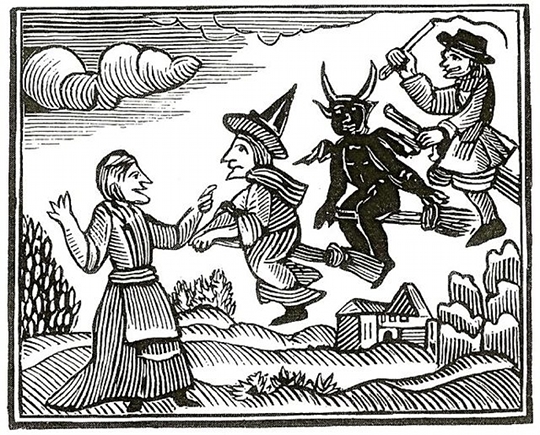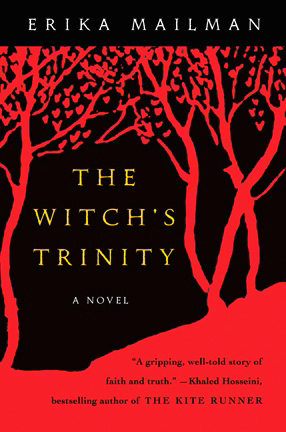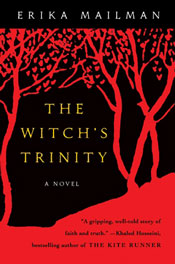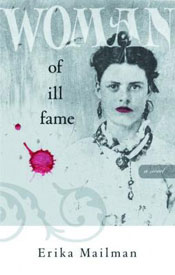Guest Blog Post by author Erika Mailman
Why are witches affiliated with Halloween?
It’s so funny—I initially thought, “What a silly question, everyone knows why,” but the more I thought about it, the more I realized it is a strange connection and I honestly don’t know how witches got pulled into it!
Historically speaking, Halloween derives from Samhain, the ancient Celtic pagan festival which celebrates the end of the harvest season. On October 31, the curtain between the living and the dead was to be lifted, and the dead would return to walk their old paths. Samhain celebrants would light bonfires and wear costumes to keep the dead from performing malicious acts: both meant to distract or mislead them.
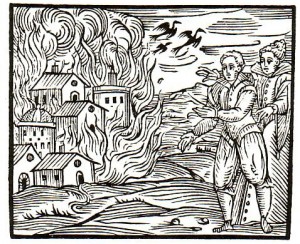 Bonfires of course bring to mind the wretched staked pyres upon which Europe’s witches were executed – is that the connection?
Bonfires of course bring to mind the wretched staked pyres upon which Europe’s witches were executed – is that the connection?
Witches are unholy and allied with Satan (part of why they were burned was so that they might not have a corporeal body to return to and enact revenge upon their executors), so it seems natural that Halloween, when the dead return to walk the earth, would be connected with witches.
I also wonder if the fear that the dead would return to ruin stored foods or cause livestock to die was quite naturally folded into the fear of witches, who were also reputed to do such things. Witches steal fertility; they murder babes and steal children. They destroy crops and wreak havoc on animals and their ability to produce food (such as hens with eggs). Since Halloween falls at the end of the harvest, people are naturally protective of their food stores as winter approaches. Witches are known to take pleasure in destroying the means of sustenance.
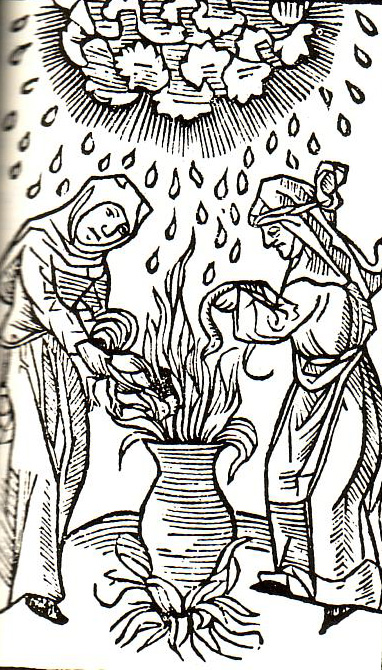 In my novel The Witch’s Trinity, villagers accuse my main character Güde of causing a hen to stop laying her eggs. This is the type of mundane, morose misfortune that women were meant to burn for. My ancestor Mary Bliss Parsons, whose story is explored in the book’s Afterword, was accused of (among many other things) making a neighbor’s ox die. He needed the ox to plow his fields and plant grain: she directly interfered with his family’s food-getting. When we look at the accusations these witches faced, they were often simple random acts of fate that the sufferer wanted someone to blame for.
In my novel The Witch’s Trinity, villagers accuse my main character Güde of causing a hen to stop laying her eggs. This is the type of mundane, morose misfortune that women were meant to burn for. My ancestor Mary Bliss Parsons, whose story is explored in the book’s Afterword, was accused of (among many other things) making a neighbor’s ox die. He needed the ox to plow his fields and plant grain: she directly interfered with his family’s food-getting. When we look at the accusations these witches faced, they were often simple random acts of fate that the sufferer wanted someone to blame for.
This year as my daughters happily don their pointed hats and their striped socks, I have to remind myself to take a deep breath. That period of history is over… or is it? On February 7 of this year, a woman in Papua New Guinea was burned to death as an accused witch. Hundreds watched as she was doused with gasoline and burned inside (or on top of—news reports vary) a pile of old tires. If one scans news reports carefully, the world is still actively seeking out and punishing witches.
Here is a sampling:
May 2009: CNN reports on abuse of “child witches” in Nigeria
Sept. 2008: A soccer game erupts in riot in Congo for fear of witchcraft: 15 fans trampled to death
April 2008: Attempted lynching in Congo for witch craft
Nov. 2007: The New York Times reports on children in Angola, Congo and Congo Republic being branded as witches and abandoned to street-life by their parents (as young as six).
I have loved thinking about witches ever since I was a child. I still viscerally recall the witch mask, green and warted, that my three sisters and I alternately wore for years. But part of what I loved was the safe “over and doneness” of it all. I’m appalled and so, so inexpressibly sad that it isn’t over.
An Excerpt from The Witch’s Trinity
“Künne looked down at her arm, the betrayer of her entire body. “The great and mighty God has blessed me with herb knowledge,” she said. “I look at my own arm and know I may pack it with herbs and in a moon’s phase heal it. I know, too, that I may make a pessary for Frau Zweig that will help fasten her husband’s seed in her and later ease her in childbirth. I will remove the hex from the hen and she will lay again. I will make my potions that everyone in the village relies on, to lessen a fever or bring the humors to their proper balance. I will be a slave to this good village, devoting all my labor to undoing my treachery.”
“She never will!” screamed Frau Zweig.
“God has given you herb knowledge?” asked the Friar. “We all live and die according to his mandate. It is his will that we burn in fever or rise from the sickbed. You are blasphemous to think you have such power!”
“But you say my herbs had the power to cause Frau Zweig to expel her babes, is that not blasphemous as well?” She faltered through this short speech, and I groaned as I heard it. I knew what she had just spoken had sealed her death. Silence reigned, then Künne began to cry. I sank onto my knees and Jost put his hand on the crown of my head. The Friar adjusted his robes and when he raised his head again his face was filled with fury.”
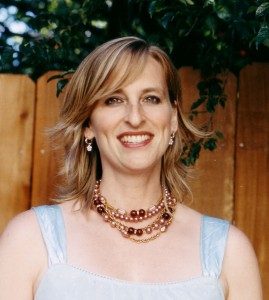 Erika Mailman is the author of The Witch’s Trinity, a novel about a medieval woman accused of witchcraft by her own daughter-in-law. The book contains an Afterword about Mary Bliss Parsons, an ancestor of the author who was accused of witchery.
Erika Mailman is the author of The Witch’s Trinity, a novel about a medieval woman accused of witchcraft by her own daughter-in-law. The book contains an Afterword about Mary Bliss Parsons, an ancestor of the author who was accused of witchery.
Visit her website: www.erikamailman.com.
Thank you Erika for sharing this important story.

